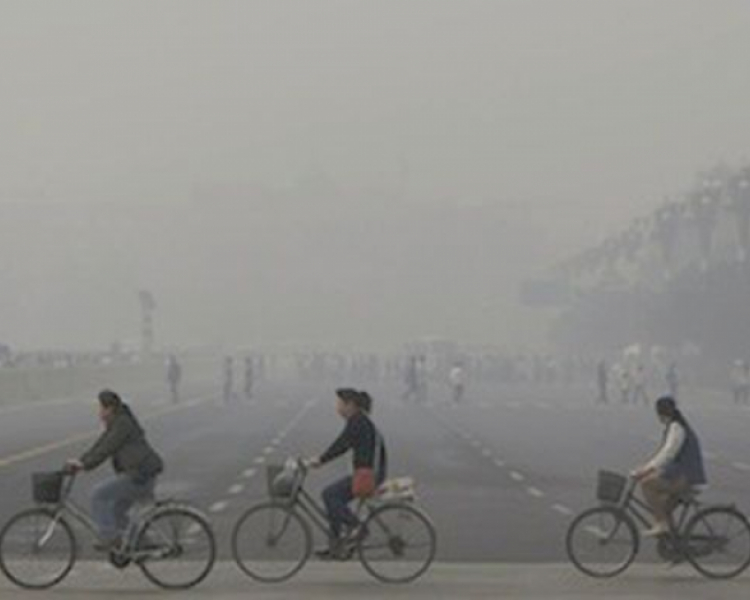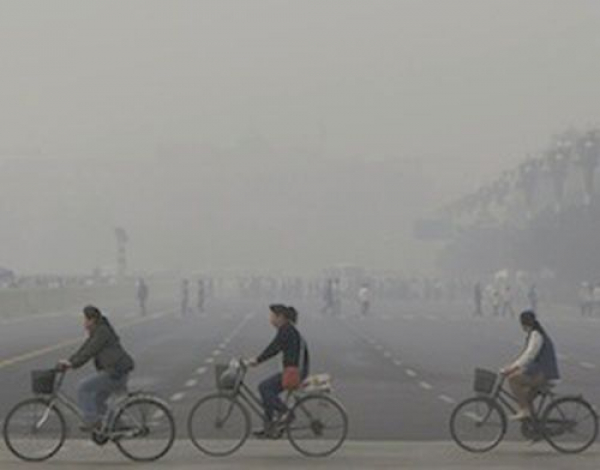Apparently blissfully unaware that socialist regimes have an abysmal environmental record, UN Climate Chief Christine Figueres announced that Communist China has the best model for fighting climate change. She said she favored the totalitarian system in China as it is much more efficient in combating climate change and that the partisan divide in the U.S. Congress "was very detrimental to passing any sort of legislation to fight global warming."
China is probably the worst air polluter on the world stage today, and air pollution is the sole source of human green house gas emissions. Air quality is so bad that it's estimated that 1.2 million people died prematurely in 2010 alone and lung cancer now is leading cause of death from malignant tumors. Many of those who have died were nonsmokers.
NBC News reported that Beijing was experiencing horrific air pollution on Thursday, January 16th . . .
Air pollution readings spiked across China’s capital Beijing on Thursday, prompting residents to don air masks and offices and homes to put electric air purifiers on overdrive.
Commuters across Beijing found themselves cloaked in a thick, gray haze as air pollution monitors across the city registered readings over 20 times the recommended exposure levels suggested by the World Health Organization (WHO).
Beijing Municipal Environmental Protection Bureau readings Thursday for PM 2.5 – air particulate smaller than 2.5 microns blamed for a range of severe respiratory ailments – registered over 500 micrograms per cubic meter. The WHO recommends no more than 25 micrograms per cubic meter.
Officials in Beijing issued a severe air warning and urged residents to wear protective masks while outdoors, and said the elderly and schoolchildren should stay indoors until conditions improved.
Colin Grabow, writing at the Federalist, provides examples of the former Soviet Empire's environmental record.
When the Berlin Wall came down and the Iron Curtain was finally lifted to expose the inner workings of communism to Western eyes, one of the more shocking discoveries was the nightmarish scale of environmental destruction. The statistics for East Germany alone tell a horrific tale: at the time of its reunification with West Germany an estimated 42 percent of moving water and 24 percent of still waters were so polluted that they could not be used to process drinking water, almost half of the country’s lakes were considered dead or dying and unable to sustain fish or other forms of life, and only one-third of industrial sewage along with half of domestic sewage received treatment.
The desertification of the Aral Sea, the work of Soviet planners, was one of the worst environmental clamities ever.
In the early 1960, the Soviet government decided the two rivers that fed the Aral Sea, the Amu Darya in the south and the Syr Darya in the northeast, would be diverted to irrigate the desert, in an attempt to grow rice, melons, cereals, and cotton. This was part of the Soviet plan for cotton, or “white gold”, to become a major export.
…From 1960 to 1998, the [Aral Sea]’s surface area shrank by approximately 60%, and its volume by 80%…The amount of water it had lost is the equivalent of completely draining Lake Erie and Lake Ontario
After giving more examples of Communist environmentalism, Grabow explains that inherent structual flaws in totalitarian systems ensure failure caring for the environment, just as they do in other facets of life.
Perhaps most obviously, communism invariably means authoritarianism (how else would a New Soviet Man emerge to work towards the bright, shiny future prophesied by Marx and Engels without re-education camps and control over the levers of societal machinery?), with little tolerance for dissent or concerns about hazardous waste in the worker’s paradise. To voice the opinion that perhaps not quite all was well, or that the air smelled funny, was to invite suspicions being a saboteur, kulak or harboring bourgeois tendencies.
Second, communism means an absence of property rights, having all been surrendered to “the people,” which is to say the state. As that which belongs to everyone in fact belongs to no one, who is to be confronted over the factory sending toxic plumes into the sky which then descends on the cornfield, or the dumping of waste into the river plied by tourists on cruise boats? And who really owns the cornfield or the boats?
Lastly, communism also simply cannot compete with capitalism in the production of wealth and technology, both of which greatly assist in addressing environmental problems. Why should anyone be surprised that only one East German power station had the necessary equipment to scrub sulphur from its emissions? This, after all, was a country whose answer to Western automobiles — the Trabant launched in the late 1950s — did not even include a fuel gauge in its early versions, something first introduced decades prior (unsurprisingly the Trabant was also bad for the environment, emitting nine times the hydrocarbons and five times the carbon monoxide emissions of the average European car of 2007).
As is typicall with left wing elitests, Ms. Figueres admires the unfettered exercising of power by leaders in totalitarian states with little regard to the effectivness of the implementation of that power or the consequences for the rights and welfare of the people.
Share This Post...





-
Photo Credits:






